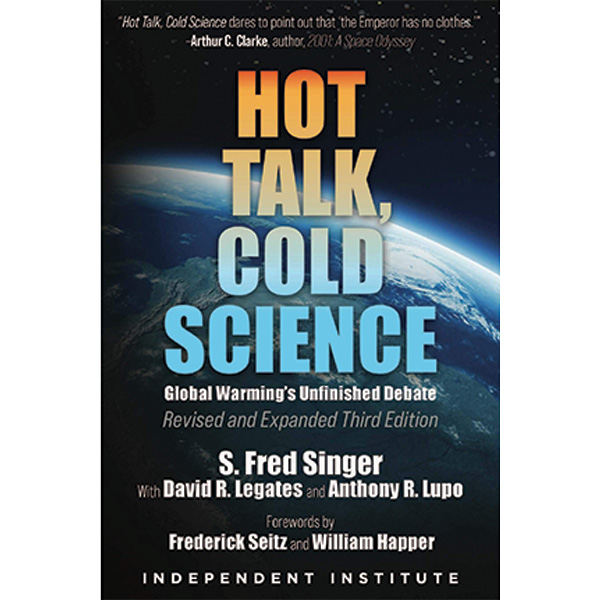Hot Talk, Cold Science: Global Warming’s Unfinished Debate
$18.99
Climate orthodoxy claims catastrophe is inevitable. S. Fred Singer — joined by David R. Legates and Anthony R. Lupo — rebuts with evidence: flawed temperature records, failed computer models, and overlooked natural drivers such as solar cycles, oceans, and clouds. Hot Talk, Cold Science documents suppressed debate, exposes politicized science, and argues that modest warming may bring benefits like longer growing seasons. A forceful case for reopening the unfinished debate on global warming.
Description
“Settled science” was the rallying cry. But in Hot Talk, Cold Science: Global Warming’s Unfinished Debate, S. Fred Singer insists the case is far from closed. This book names the weaknesses hidden in plain sight: temperature records adjusted beyond recognition, computer models diverging from real-world data, and the refusal to acknowledge natural forces — solar variation, cloud cover, ocean currents — that shape Earth’s climate as much as, if not more than, human activity. Singer makes this the heart of his charge.
Drawing on satellite records, proxy measurements, and declassified correspondence, Singer documents how climate projections have repeatedly failed, from overblown sea-level rise forecasts to the “pause” in warming during the early 2000s. He contrasts official alarmism with evidence of possible upsides: a greener planet, longer growing seasons, and reduced energy demands in colder regions. With chapters that pit Malthusian pessimism against Cornucopian optimism, the book confronts the narrative that only catastrophe lies ahead.
Singer and his colleagues also indict the gatekeeping of climate discourse. They describe how emails were deleted, dissenting voices sidelined, and peer review weaponized to enforce conformity — echoes of the Climategate revelations. What emerges is not just a scientific dispute but a warning about the politicization of science itself, where public policy gets ahead of the facts.
For readers seeking more than headlines, this edition delivers a meticulously argued, evidence-rich counterpoint. Whether examining carbon dioxide’s actual role in climate dynamics or weighing the merits of adaptation over costly mitigation, Singer presses for an honest accounting. His challenge is timely: to ask whether the debate was silenced too soon — and whether preparing for uncertainty, even cooling, is wiser than betting everything on one narrow forecast.
Urgent, documented, and unflinching, Hot Talk, Cold Science is for readers who want the full picture before accepting “consensus” as conclusion. (2021, HB, 234pp)
You may also like…
-

AGENDA 21: How Will it Affect You? (Cased)
$5.95 Add to cart -

The UN’s Agenda 2030: Marxist Stealth Plan for World Government
Price range: $1.99 through $9.95 Select options This product has multiple variants. The options may be chosen on the product page -

Inconvenient Facts: The Science That Al Gore Doesn’t Want You to Know
$13.99 Add to cart


